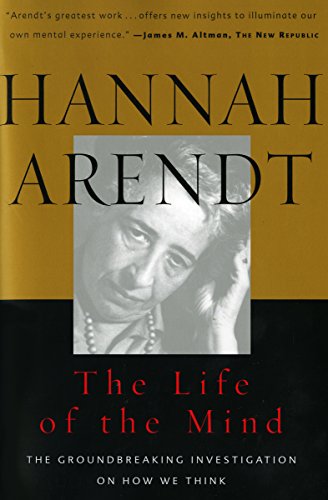
The Life of the Mind

Men, though they are totally conditioned existentially—limited by the time span between birth and death, subject to labor in order to live, motivated to work in order to make themselves at home in the world, and roused to action in order to find their place in the society of their fellow-men—can mentally transcend all these conditions, but only
... See moreHannah Arendt • The Life of the Mind
remembrance, by which you make present to your mind what actually is absent and past, reveals the meaning in the form of a story.
Hannah Arendt • The Life of the Mind
The activity of knowing is no less related to our sense of reality and no less a world-building activity than the building of houses.
Hannah Arendt • The Life of the Mind
being, endowed with sense organs and brain power, is subject. The opposite of necessity is not contingency or accident but freedom. Everything that appears to human eyes, everything that occurs to the human mind, everything that happens to mortals for better or worse is “contingent,” including their own existence.
Hannah Arendt • The Life of the Mind
Mnemosyne, Memory, is the mother of the Muses, and remembrance, the most frequent and also the most basic thinking experience, has to do with things that are absent, that have disappeared from my senses. Yet the absent that is summoned up and made present to my mind—a person, an event, a monument—cannot appear in the way it appeared to my senses,
... See moreHannah Arendt • The Life of the Mind
Thinking, no doubt, plays an enormous role in every scientific enterprise, but it is the role of a means to an end; the end is determined by a decision about what is worthwhile knowing, and this decision cannot be scientific. Moreover, the end is cognition or knowledge, which, having been obtained, clearly belongs to the world of appearances; once
... See moreHannah Arendt • The Life of the Mind
Foucault Could have written this .
This would cause no great problem if we were mere spectators, godlike creatures thrown into the world to look after it or enjoy it and be entertained by it, but still in possession of some other region as our natural habitat. However, we are of the world and not merely in it; we, too, are appearances by virtue of arriving and departing, of
... See moreHannah Arendt • The Life of the Mind
we are what men always have been—thinking beings. By this I mean no more than that men have an inclination, perhaps a need, to think beyond the limitations of knowledge, to do more with this ability than use it as an instrument for knowing and doing.
Hannah Arendt • The Life of the Mind
scent of each of them.”81 Philosophy, one is inclined to agree, did go to Homer’s school in order to emulate his example. And one’s tendency to agree is considerably strengthened by the two earliest, most famous influential of all thought parables: Parmenides’ voyage to the gates of day and night and Plato’s Cave parable, the former being a poem
... See more